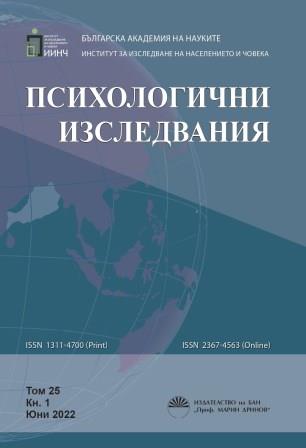Do we Perceive Experiencing More Stress in Early Adulthood if we Had Perceived Experiencing Parental Rejection in Childhood?
Do we Perceive Experiencing More Stress in Early Adulthood if we Had Perceived Experiencing Parental Rejection in Childhood?
Author(s): Nadia KoltchevaSubject(s): Developmental Psychology, Clinical psychology
Published by: Институт за изследване на населението и човека - Българска академия на науките
Keywords: acceptance-rejection; psychological adjustment; perceived stress; young adulthood; IPARThe¬ory.
Summary/Abstract: The article aims to present research on the relationship between perceived maternal and paternal acceptance-rejection, psychological adjustment, and perceived stress in early adulthood.The sample consists of 322 subjects between 20 and 40 years of age (M=29.42, SD=6.41). The sample is not gender-balanced (248 women (77%) and 74 men (23%), almost all of them Bulgarian (295, 91.6%; 1, 0.3% of Turkish origin and 26, 8.1% missing data), most of them university graduates (235, 73%), employed (239, 74.2%) and married or cohabiting with a partner (246, 76.4%). Questionnaires for data collection: Parental Acceptance-Rejection Questionnaire, Adult, Short Form, both Mother and Father Version; Personality Assessment Questionnaire, Adult; Perceived Stress Scale, Personal Information Form.The results show that both perceived maternal rejection and perceived paternal rejection are associated with perceived stress in early adulthood. The level of psychological maladjustment is strongly related to the levels of perceived stress as this correlation is higher for 20-year-olds (r=0.703, p<0.01) in comparison to 30-year-olds (r=0.668, p<0.01). Several regression models are presented regarding predictors of perceived stress. All the models with predictors of perceived maternal rejection, perceived paternal rejection, and/or psychological maladjustment are significant. Psychological maladjustment in itself is a good predictor of an individual’s perceived stress. The percentages of explained variance vary between 44.3%-49.1%. Most of our findings support the IPARTheory’s postulates and are consistent with the results of other studies. The results are discussed, and new questions are raised.
Journal: Психологични изследвания
- Issue Year: 25/2022
- Issue No: 1
- Page Range: 20-34
- Page Count: 15
- Language: English

